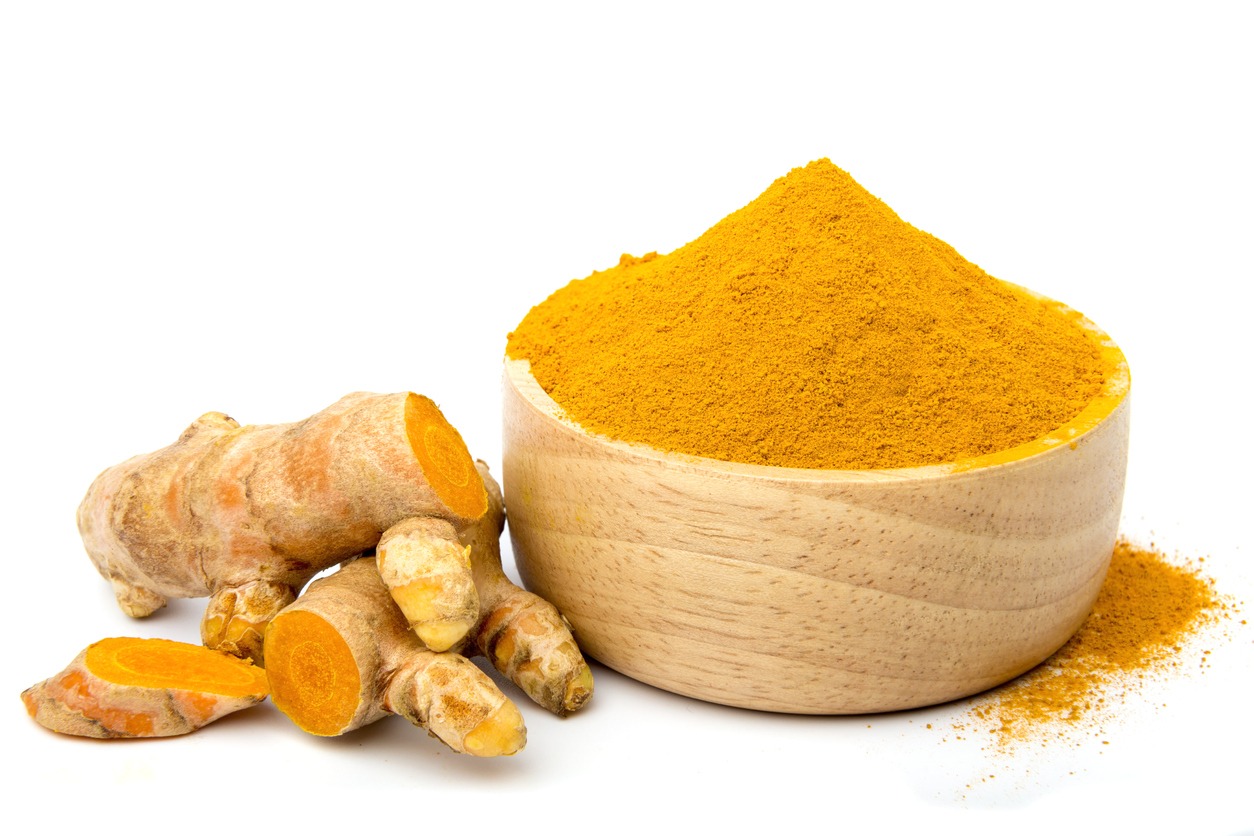Healthy living has gotten a lot of new interest in recent years, as many Americans have discovered that the standard way of doing things often results in a decline in health over time. Some of the things that have begun to experience a return to public awareness include a better understanding of how different herbs and spices have benefits to health as well as taste. One of these is the herb turmeric.
Turmeric has been used for thousands of years but has recently become quite popular. Its roots are in India and Asia and is a primary part of curry powder and Ayurvedic (holistic, or whole-body) medicine. Part of the ginger family, the rhizome is dried and powdered. Some say it smells a little bit like mustard, but its bitterness is more peppery. It contains quite a lot of nutrients, including vitamin C, calcium, iron, sodium, protein, dietary fiber, potassium, magnesium, manganese, and vitamin B6.
There are a variety of things that turmeric has been shown to help and improve. Many studies – both formal and informal – have been done to discover the uses and benefits of turmeric. Just a couple tablespoons daily can result in some or all of the benefits below.
Anti-inflammatory
The main plant compound in turmeric is curcumin, which is known to lessen inflammation. Nearly everything that negatively affects your body causes inflammation. This can reduce pain in joints and muscles, with results similar in effect to those produced by phenylbutazone and hydrocortisone.
Because it reduces inflammation, it is also excellent to treat IBS (irritable bowel syndrome) and similar intestinal issues. Many people discover that the addition of turmeric to their diet, or through supplements, significantly reduces their symptoms and improves digestion. This can result in relief for stomach pain or dyspepsia, as well.
Memory improvement and Alzheimer’s prevention
Many older Americans face the disheartening and difficult diagnosis of Alzheimer’s. While a cure has not yet been found for the disease, there have been promising results from using turmeric to prevent the onset of Alzheimer’s. Research into this is still in process.
Memory, in general, may be improved by eating turmeric, as a study discovered that people eating more curry scored higher when testing cognitive function (attention span, memory, and similar) than those who did not. A more recent study of seniors found that a curcumin supplement improved memory compared to a placebo. Research on these effects is continuing.
Heart disease and hypertension
Curcumin’s antioxidant action curtails the oxidation of cholesterol, reducing plaque, which in turn reduces blood pressure. Turmeric also contains vitamin B which keeps levels of homocysteine under control. Blood vessel health is supported through the intake of turmeric.
Cholesterol control
Curcumin has been shown to affect the liver cells, causing them to create good cholesterol and limit the production of bad cholesterol. Using turmeric on a great meal of meat and vegetables will increase the benefits!
Anti-cancer
While cancer may not be completely curable yet, turmeric’s antioxidants can relieve the symptoms of some cancers and can prevent damage to cells and DNA, which can prevent some cancers from even getting started. It is suggested that including turmeric in foods from the time a child begins eating table food can reduce the risk of leukemia; research is ongoing. Another cancer that has shown good response to curcumin is prostate cancer, which occurs very rarely in India where turmeric is a common ingredient. Also, a study in 2006 found that precancerous colon polyps decreased by more than half when people began consuming more curcumin, so increasing turmeric in the diet may prevent this cancer, as well.
Osteoarthritis pain relief
Because arthritis often includes swelling and inflammation, the curcumin in turmeric can soothe the pain of osteoarthritis. Additionally, turmeric contains a powerful antioxidant, which also improves the internal health of your cells in both bones and muscles, which will also aid in relieving pain from arthritis.
Blood clot prevention
Blood clots that are caused by oxidized cholesterol will be stopped in their tracks – before they start – when you ingest more curcumin, such as through turmeric. Cardio exercise is also helpful, working in conjunction with the curcumin. Additionally, the intake of turmeric will not generally interfere with blood pressure medication. However, if you are on blood thinners such as warfarin or coumadin, speak with your doctor about curcumin and possible effects.
Cystic Fibrosis
Studies have determined that curcumin has been found to correct a lung defect related to CF in rats, and research is continuing to determine if it will help humans in the same way. There are people with Cystic Fibrosis who are already consuming curcumin as a part of their treatment regimen and results so far have been favorable.
Liver support
While the liver is one of the most self-healing organs in the body, it is still vital to take care of it. Studies in Israel have shown that curcumin assists in repairing liver tissues that have been damaged, and cirrhosis can be prevented or treated with curcumin.
Healthy skin
Pimples and acne, which are caused by bacteria and oils, are often reduced with the intake of turmeric. Its antioxidants, as well as its properties of anti-inflammation and antiseptic, help skin to be healthier and smoother.
Weight loss
Curcumin has also been shown to aid in the suppression of fat tissues in the body. Some research indicates that fat cells are broken down or their growth is slowed with the use of turmeric, which can help weight loss to occur at a faster rate than a healthy diet alone. It also speeds up metabolism, which increases the quantity of calories burned.
Anti-depressant
Research shows that curcumin’s affect on the body includes hormone balance. These studies found that curcumin works much like Prozac on many patients, making it a viable alternative to potentially addictive pharmaceutical anti-depressants for some people.
Tasty food
Of course, the biggest challenge for most things that are good for you is ingesting them, since the stereotype of “if it is good for you, it tastes bad” is too often true. However, that is not a problem with turmeric! Its flavor works well in many dishes, and is excellent for dishes with vegetables and rice, in sauces, and even in a new fad called “golden milk” which is made with milk (dairy or plant), turmeric, black pepper (which helps the body to use the turmeric), and a bit of honey or nutmeg.
Turmeric has so many good and positive effects, and it is very easy to increase one’s intake of this amazing herb. Regardless which benefit intrigues you more, there are few people who would not find positive results from an addition of a consistent dose of turmeric to their daily lives.

